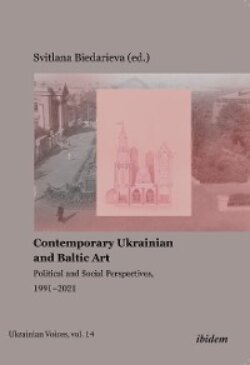Читать книгу Contemporary Ukrainian and Baltic Art - Группа авторов - Страница 7
На сайте Литреса книга снята с продажи.
Faster than history
ОглавлениеChange seems to be the most continuous characteristic of the postsocialist space, which the Baltic states have eagerly sought to leave, simultaneously realizing that they are stuck in a periphery that represents a “historical juncture at which the postcolonial ghost emerges in the background of the postsocialist drama,” as scholar Madina Tlostanova has put it. (Tlostanova 2017, 4) This state of permanent change started in the 1990s, with the shock therapy transition from socialism to capitalism and the adaptation to radically new circumstances. In the following decades, it continued with institutional and structural transformation policies, like the enlargement of the European Union and the waves of ever-new “dramas” caused by regional and global factors, including refugees and migration, economic and climate challenges, and the current health crisis. Accompanied by more mundane but no less crucial transfigurations, adjustment to the Western neoliberal system has constantly brought tensions and disillusionment about the lag and secondary status of these societies compared to Western countries. Also, attitudes and reactions towards these transitions have revealed the broadest spectrum of views, ranging from enthusiasm about joining the “free world” in the early 1990s to the recent crisis of the growing dominance of right-wing populism and the ever-broader gap between the ideologies of liberalism and conservatism.
Besides, this state of permanent transition has moved at a speed that has been faster than history, forming tense relations with the recent past, the present, and the imagined future. Faster than History1 was also the title of one of many exhibitions that, celebrating the Eastern enlargement of the EU in 2004, sought to strengthen new regional dialogues between artists from the Baltic Sea Region who were reflecting on relations between the West and East, on how the borders had shifted and how the foreign and the “other” were becoming familiar and close. Their works referred to issues including the legacy of the past, locality, identity, stereotypes, memory, regional transformations, and the reinterpretation of particular experiences. None of these issues have lost their relevance in the regional art context today, although the perception and understanding of them has changed, now questioning and foregrounding ambivalent, contradictory, and formerly ignored aspects. Moreover, the acceleration of change as a global contemporary condition that reduces local differences has been accompanied by a more transnational perspective and critical views of such exploited notions as the uniqueness of national cultures and histories, their alterity, and other myths constructed by nationalist discourses. Interconnection between local and global sensibilities and shared experiences has become even more contextualized, as the regional art scenes have increasingly integrated into the global art system and adapted to its language, themes, discourses, and knowledge production.
For instance, the adjustment to constant change as a Survival Kit is reflected in the eponymous art festival in Riga, organized by the Latvian Centre for Contemporary Art.2 Established in 2009, it arose as a reaction to the global economic crisis, with the aim of calling on society to respond to changes in the contemporary world and to consider various survival strategies. In the following iterations it has focused on different locally and globally significant themes of survival and change, including downshifting; the “slow revolution” as a form of civic engagement; how to have an impact on critical events with small, mundane gestures; how to learn from nature and think about future ecosystems; how to revisit discourses of security, through which inequality, nationalism, racism, and other reactionary attitudes and policies continue; how to live in an aging society; and how to deal with problems that have been caused by the actions of previous generations.
